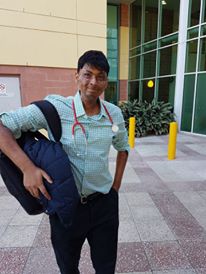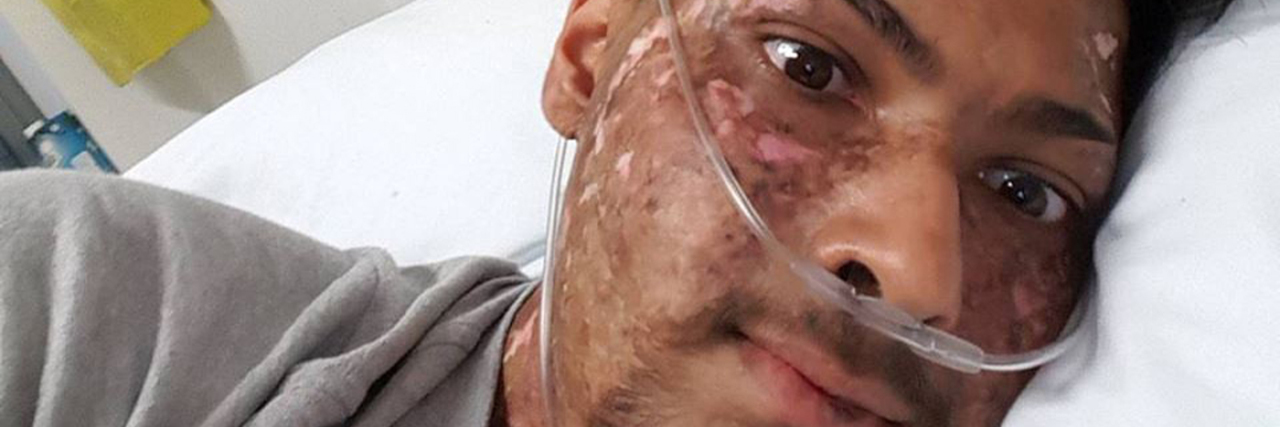We seem to always focus on the negative.
Amidst all the tragedy of things going on in the world and all the ways in which things seems to be getting worse, unbeknownst to most, because of our natural inclination to see the rapid degradations as opposed to the gradual improvements that are made everyday, the world is getting better.
Poverty rates and hunger are actually the lowest they’ve ever been. Longevity is up. Preventable mortality down. Cancer survival has flipped for pediatric patients — from 85% mortality rates to 85% survival. Advancements in technology are making us worry about how we’re goingto sustain an economy where robots remove the very need to work.
Things are getting better.
It doesn’t always feel like it is though. I guess, when I was told I had cancer, I had this notion surviving would lead to me getting back my old life. Perhaps, being even stronger, for all that had gone down. But instead, I’m stuck, four years post treatment — cured, but suffering, sometimes even more than during chemo, it feels.
The chronic disease I think lingers for many: Depression. The anxiety that I believe plagues many — of relapse, work, finances — the struggle of patching up an interrupted life. The nightmares from all that trauma. The anguish of loss, of limbs, looks, and self to this disease… all make it hard to feel like we’re getting better.
I think we’re expected (and we expect ourselves) to act like and be that stereotypical cancer patient — a “warrior,” brave and blessed, changed and grateful for what’s we’ve endured. These symbols of courage and determination — to have kicked cancer’s ass and come out the other side — make us stronger than ever.
In truth, I think the silent majority end up feeling nothing like that. Often, it’s the opposite.
It’s not easy to feel grateful for the worst thing that’s happened to you. But at the same time, we too often forget to experience or acknowledge the good things amidst all this.
I saw my doctor on Thursday, and he told me, “Nikhil, when I passed you in the waiting room, I almost mistook you for a normal person!”
Perhaps weirdly put (don’t worry, I don’t get phased by these things anymore), it made me think. Despite all the crappy stuff that’s gone down the last few months — from losing thousands despite playing pretty damn well in Vegas (I’m a poker pro who plays for charity and despite winning last year, I did the exact opposite this year), to getting food poisoning three times the month after getting back home to Australia, to being in the hospital for a few months straight and most recently, dodging a flu bullet to my already iffy lungs — I’m actually sort of getting better.

I’m off some meds that I’d been taking for years… perhaps forever.
My steroid dose is coming down, which will hopefully further make me look like a “normal person,” haha.
My body is perhaps cramping less — something that’s plagued me for years after taking away a medicine that I’d correctly thought was causing them to become worse.
I’m about to get these braces for my feet that’ll hopefully allow me to get back into basketball, too!
But at the same time, I still don’t really feel like things are getting better at time. When the cramps do strike and stop me from doing things, when that mental fog hits just as I’m getting into work, when the pain strikes, leaving me screaming at night — when these things combined spin me into a chemically-induced depression I just can’t fight — I can’t help but feel things aren’t getting better.
But in the end, like I did with my cancer the first time around, I’ve gotta take a step back and acknowledge a few things.
Yes, having to face multitudes of suffering despite “beating” cancer sucks, but in the end… I can’t change that. Not all of it, at least.
Though admitting that may seem like I’m giving up hope, it can also mean instead of fixating on this, I’ll now focus on the things I can control. Doing anything and everything I can and should be doing, not being hard on myself for feeling this way (as opposed to being grateful, as is often expected of us) and focusing my time and efforts on the things I could change rather than the stuff I couldn’t.
Acknowledging your limitations, or that you’re hurting, doesn’t necessarily lead you into misery. It isn’t weak.
More often than not, it’s actually the best thing to do for yourself. It’s the very opposite of weak. It takes courage to admit you’re struggling. And it’s the first step on the path to recovery because ultimately, it gives you back the power to control the one thing you’ll always have control of, even if it doesn’t seem like it sometimes — your mind and how you view things.
Life often makes traps us in the gloom. But often it’s better than we think it is.
Doing this simple process of taking a step back, facing and accepting the pains and obstacles in your path, and focusing on what you can do instead of what you can’t, can help you see you do have quite a lot.
That you can be content. That you always can. No matter what you’re going though in life.
But sometimes, being content isn’t good enough. Especially when pain or trauma keeps on striking, or when bad things keep happening, to you or to this world. Well, luckily, we can vanquish this feeling as well.
By doing something about it.
I don’t want to be stuck in this position, with this condition that forces me to plan out my meals and drinks to minimize even my toilet trips every night. That’s no way to live life. That’s why I choose to keep finding alternatives.
A couple of years in med school comes in handy here, which is why, even after an old doctor said there’s nothing they can do for me, there’ll never be any research done on this, and I’d be suffering from this my whole life (something I believed for a while), I eventually set out to find something that could help.
And now, I’ve found three drugs that work — two very effectively that I must’ve developed tolerance to, and one that’s at least allowing me to exercise and get some of that function back. I’ve got a list of another 40 or 50 to try. I’m gonna try and write up my findings as a literature review somewhere.
Even if all these fail though. Even if they become more and more desperate until it’s apparent there likely will be nothing that can be done… this way, I’ll at least be going down on my terms. Swinging. I’ll be facing my demons with, at the very least, an occasional smile on my face, knowing I’d done everything I could.
It may not seem like much. It certainly doesn’t feel like it sometimes, but it’s the difference between going into the Colosseum alone and afraid, or going in calmly, knowing I’ve done my best to escape this fate. And that now I have, why not enjoy and savor the moments I can?
That’s everything.
But I also don’t want to be content with the progress the world’s been making. Because although it is good we’re heading in the right direction, I feel we can and should try to get there faster. Millions of lives literally hang in the balance, and every bit counts.
Recently, I decided to found Get To Sleep Easy. We’re developing the first ever adjusting wedge pillow that’ll not only help millions of patients get better sleep, but also potentially help them get their posture right in bed. It’s also for hospital beds and has revolutionary features that could save hundreds of thousands of lives, millions of days in the hospital and billions in healthcare expenditure by reducing the rates of common, unnecessary complications of hospital stays.
Things that kill cancer patients.
The profits will all be donated back to charity, from things like funding research for underfunded, high reward projects and diseases affecting the developing world, to developing a version of these beds, whose principles can be applied to low resource settings for the developing world — all creating an even larger impact!
I’ve been funding this with my poker money and scholarships so far, and though it has been getting the job done, it isn’t the most reliable source of money. We’ve applied for grants and we’re pitching to corporate partners, and have some amazing things coming though, but we’d love your help on this journey, too.
Every little bit counts. You can check out the website for more info.

But yeah, after going through a rough patch, the words of a very wise person I take for granted too often made me think of how much I had. I hope my musings can help you see you have so much on your side, too — that you always will — and that being down and out sometimes isn’t weak.
It’s actually the best thing you could do for yourself.
Nikhil Autar was diagnosed with acute myeloid leukemia at 17 and given a 10-20 percent chance of surviving. Despite that, he made it into a medical degree at 18, and is currently doing medical research and running his social enterprise, Get To Sleep Easy. You can find him here or at his blog, Musings of a Med Student Patient.
We want to hear your story. Become a Mighty contributor here.

